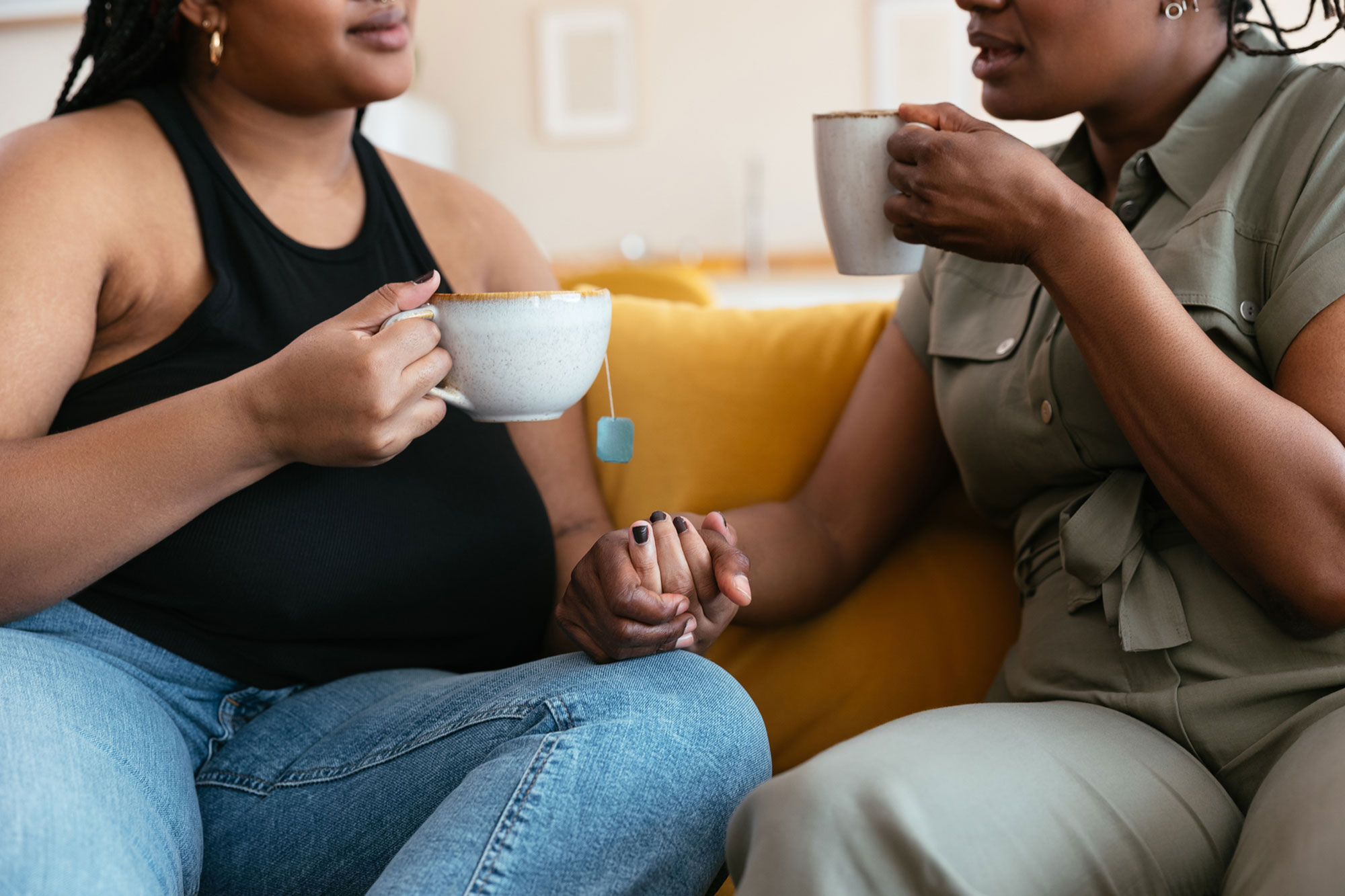While the internet and modern entertainment glamorize romantic relationships, if you ask couples who have weathered many years (and storms) together, they’ll say this depiction is far from the truth. Sure, flowers, candlelit dinners, and steamy bedroom sessions are part of being a couple — but they don’t ensure you can make it through anything. Instead, therapists and relationship experts repeat time and time again that it’s the super-small yet super-meaningful habits that make a relationship last. And bring you closer to your partner so you can handle frustrations, miscommunications, and other hurdles as they come. Why are these daily and weekly rituals so vital? They keep you connected and ensure you are working toward the same goals and meeting one another’s needs.
Meet the Experts
Bonnie Scott, LPC, is a therapist and owner of Mindful Kindness Counseling.
Yvonne Thomas, Ph.D., is a psychologist.
Bethany Cook, PsyD, HSP, MT-BC, is a licensed clinical psychologist, health service psychologist, adjunct professor, and a board-certified music therapist.
This Valentine’s Day, take a moment to review our checklist (prescribed by experts, of course) of impactful habits to ensure you’re putting in the elbow grease of your relationship. And if you’re not? Consider it a challenge to make it a priority in the year ahead. Better yet: Pop a bottle of champagne and discuss these rituals with your beloved, so you can discuss how you can make your relationship stronger together.
Actively seek ways to make your partner’s day a little easier.
When you love someone, you want them to be happy. And not only in your couplehood but in every aspect of their life. That’s why it’s so impactful to actively seek ways to make your partner’s life a little easier, says Bonnie Scott, LPC, a therapist and owner of Mindful Kindness Counseling. Not only does this show that you want things to go smoothly for them, but also that you’re on the same team.
For example, Scott says she and her husband drink different coffee but only have one coffee maker. So, whoever makes theirs first always cleans the pot immediately, so it’s ready for the next person. “It shows we appreciate each other’s time and we want the other person to be able to meet a need easily. It seems minuscule, but I always get a spark of appreciation for him when I find the pot ready to go,” she adds.
As you go through your day-to-day, think of the pain points your partner constantly complains about. Maybe they dislike carrying heavy laundry downstairs — take the hamper with you for them. Or, they don’t mind loading and unloading the dishwasher, but they can’t stand washing big pots and pans — take that off of their plate. Do they have a meeting that seems to be running long? If you have the time, whip up breakfast for them. These gestures make us feel loved, appreciated, and valued.
Don’t discount the importance of a date night.
When you’ve been together for several years, live together, and potentially have children together — it becomes a lot of together time. And though, yes, you are seemingly around one another 24/7, all of those hours add up in quantity but not quality. That’s why so many relationship gurus encourage couples to commit to regular date nights. Preferably, if you can swing it, once a week, says psychologist Yvonne Thomas, Ph.D.
“Too often, relationships get stale, and the partners take each other for granted. Couples have little — or no time — for each other, and they can start unwittingly growing apart or even feel hostility towards each other,” she continues. “To trouble-shoot this, take turns putting on your joint calendar and planning a date night which will last at least a couple of hours for just the two of you.”
If you are already starting to sweat thinking about the time it takes to research a restaurant, book a reservation, and hire a sitter, take a pause. As Dr. Thomas reminds us, date nights don’t have to be extravagant or expensive. Rather, she says this gesture contributes to long-term success and happiness in a relationship by giving the couple time to connect, appreciate, and enjoy each other’s company.
Have a meaningful physical interaction.

Be honest: How many times in a day do you kiss, hug, or otherwise touch your partner? While you might have been all over one another when you first fell in love, once you are in the everyday grind of life (working, cooking, cleaning, repeating), physical intimacy falls lower on the priority list. Though this is normal — and, at times, practical — it is vital to give each other physical attention regularly, says Bethany Cook, PsyD, HSP, MT-BC, a licensed clinical psychologist, health service psychologist, adjunct professor, and a board-certified music therapist.
With the couples she’s worked with, most couples either report no sex or touching or intercourse that’s focused on “release,” rather than pleasure and connection. And if there is affectionate touch happening, it’s often unbalanced. As tricky as it can be to make time for each other in this medium, Dr. Cook says non-sexual touch between intimate partners is the thread created and spun together, which weaves a solid yet flexible foundation for a lasting relationship. “A foundation built of rocks will crack under pressure, but a foundation woven of the world’s ‘strongest and most flexible’ thread can withstand countless external pressures other foundations can not,” she says.
For the health and longevity of your relationship, make time for meaningful touch — and make it a priority. A 30-second hug, cuddling while watching Netflix (without your phones), and making out without sex are all intimate encounters. You don’t have to “go all the way” daily to make a ripple effect in physical intimacy.
Create a temperature ritual.
How you felt yesterday is probably different than how you feel today. And what you needed last Tuesday from your partner might not be what you need today. To ensure you’re on the same page, Scott suggests a daily temperature check via text, voice memo, a quick FaceTime, or whatever fits in your day.
The purpose of this is to illustrate your care for one another and provide an opportunity to check on their mood and see what they might need from you as you come back together at the end of the day. “If you know your partner had a tough day, you’re better prepared to show up for them emotionally. You feel less blindsided by whatever mood they’re bringing home because you know what to expect,” she continues. “It gives you a chance to give your mood data to them as well, so your emotional needs are more likely to be met. It’s a really small thing to do but it’s one of those habits that set partners up for success and helps you connect in the long-term.”
Put your phone down for 30 minutes.
After the baby has finally fallen asleep or you’ve finally decided your presentation for work tomorrow is good enough, you have time reserved for your partner. Do you typically have dinner, chat about your days, then retire to the living room to watch your latest streaming service obsession? And then, pick up your respective phones and scroll for an hour or two? Though it’s no secret we’re all addicted to our devices, Dr. Thomas says putting them down is a small but very significant habit to making a relationship last.
“It can feel very off-putting and upsetting to have your partner be splitting attention between you and a screen or device your partner’s been drawn towards,” she says. “At least thirty minutes to one hour before bedtime, all screens and devices can be shut off every night. This gesture contributes to long-term success and happiness in a relationship by providing a double benefit. It allows the partners time to reconnect and focus on each other and helps them start winding down from the day.”
Talk about expectations.

As much as you hope your partner will read your mind, they can’t. And you can’t anticipate their every feeling, desire, want or need, either. Yet, all too often, couples expect their partner to know how to meet expectations without ever communicating them. Then when they — of course — fall short, we are disappointed.
“We believe our expectations to be reasonable if we never examine them, but we are maybe being really unreasonable and our partner can never hit the mark,” Scott says. “But if we talk about it, our partner has a chance to rise to the challenge. We consistently increase the likelihood our needs will be met if we talk about those needs.”
She recommends setting expectations on not only the big stuff — like finances — but also the more mundane stuff. For example, on Friday, talk about what you hope for out of Saturday. Scott says you could say, “What I need to get done on Saturday is groceries, laundry, and a bit of yard work. But it’s also important to me that the whole day isn’t just chores.”
“Imagine, saying that, having a partner hear it, honor it, and you get all your Saturday stuff done? That’s a way to feel really supported and connected long term,” she adds.
Say “thank you.”
The last time your partner folded the towels and put them away, did you thank them? Or when you took care of the yard work, did your partner illustrate their appreciation? Dr. Cook says many of the couples she works with are shocked when she asks them if they “thank” their partner for doing “everyday tasks.”
The short answer? Absolutely thank them.
“Recognizing the things your partner does for the couple/family, even if doing dishes is ‘their job,’ strengthens the relationship because it lets the other person know you ‘see and appreciate’ their contribution,” she continues. “Resentment is a fast relationship eroder and tends to build with the mundane daily tasks no one wants to do, so letting your partner know you ‘see’ their work and it matters keeps resentment at bay and builds connection.”






